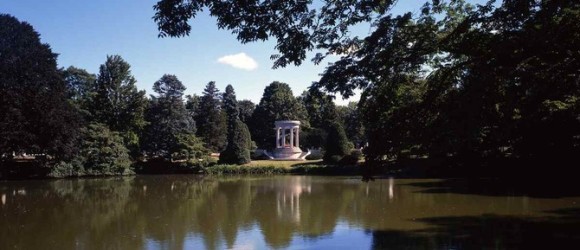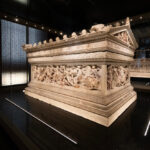Mount Auburn Cemetery Mausoleums, Cambridge, MA

In the 180 years since its consecration, Mount Auburn Cemetery has become more than a cemetery; it’s also a National Historic Landmark, a world-class arboretum and botanical garden, a habitat for urban wildlife, and a veritable museum of art and architecture. It’s a destination site, a historic landmark, an active burial ground, and an important reflection of changing culture and artistic taste.
Mount Auburn Cemetery History and Design
Mount Auburn Cemetery in Cambridge, Massachusetts dates back to 1831, when the Massachusetts Horticultural Society purchased 72 acres of woodland to create a “rural cemetery” and garden. More than 2,000 people came to the cemetery dedication from Boston and the surrounding communities. The first interment was made at Mount Auburn in 1832. Today, Mount Auburn Cemetery has expanded to 174 acres.
Dr. Jacob Bigelow conceived the idea for Mount Auburn Cemetery in 1825, motivated by concerns of running out of space if constrained to traditional burials under churches. Dr. Bigelow and Alexander Scammel Wadsworth contributed to the cemetery’s design, but Henry Alexander Scammel Dearborn, the first president of the Massachusetts Horticultural Society, was largely responsible for the cemetery’s initial design.
Mount Auburn became an inspiration for other cemetery designs; notably Abney Park in London, but also other suburban cemeteries including Green-Wood Cemetery in Brooklyn, New York, Allegheny Cemetery in Pittsburgh, Pennsylvania, and Oakwood Cemetery in Syracuse, New York.
Mount Auburn Cemetery Noteworthy Private and Family Mausoleums
Family mausoleums and private mausoleums offer picturesque resting places in Mount Auburn Cemetery. With many of the in-ground burial plots filled today, Mount Auburn continues to offer private mausoleum burial, family mausoleum interment, and community garden crypts where individuals are interred with loved ones or by themselves.
One of the most noteworthy family mausoleums in Mount Auburn is the Isabella Stewart Gardner tomb, where Gardner lies between her husband and son. Today, Gardner is best remembered for her namesake Boston art museum.
The Mary Baker Eddy monument is unique among private and family mausoleums, as its designer, Egerton Swarthout, won a design contest to create the monument. The design features a tholos form of circular colonnade columns with no roof. The monument incorporates a wild rose, a morning glory, a lamp of wisdom, and a sheaf of wheat, and has been acknowledged as one of the finest examples of the granite carving craft.
